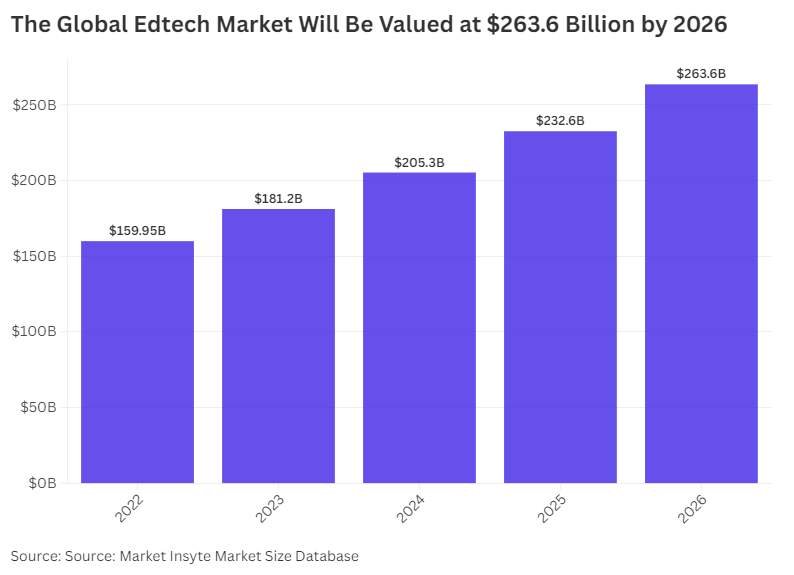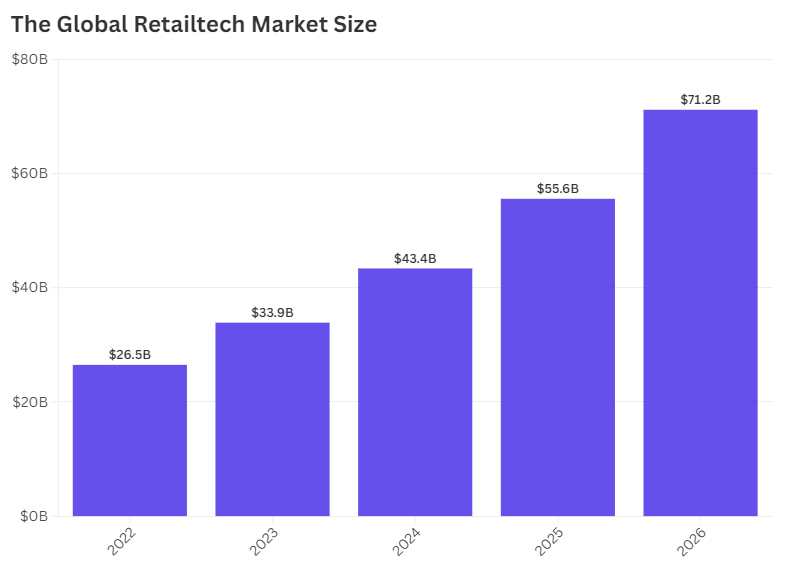Executive Summary
Immersive technology transforms interactions with the digital world by merging physical and virtual environments. It includes virtual reality (VR), augmented reality (AR), and mixed reality (MR), each offering unique experiences that enhance user engagement in simulated settings.
Immersive technologies are making significant strides in healthcare, education, retail, and manufacturing. They enhance training (e.g., VR in surgical training), customer engagement (e.g., AR in retail for virtual try-ons), and operational processes (e.g., digital twins in manufacturing).
Despite high consumer costs, immersive technologies are expected to grow, offering opportunities in various industries. Entrepreneurs should focus on healthcare, education, and retail, where these technologies are likely to drive innovation, improve experiences, and streamline operations.
The Importance of Immersive Technologies
Immersive technology is transforming how we interact with the digital world by blending physical and virtual environments. It encompasses various tools and systems that create realistic, engaging experiences, allowing users to feel as though they are part of a simulated environment. The core of immersive technology includes virtual reality (VR), augmented reality (AR), and mixed reality (MR), each offering unique ways to merge the real and digital worlds.
Virtual Reality (VR) provides a fully immersive experience by replacing the real world with a computer-generated environment. Through headsets and sensors, users can navigate and interact with 3D spaces, making VR ideal for applications like gaming, training simulations, and education.
Augmented Reality (AR) overlays digital information onto the real world, enhancing a user’s environment with virtual elements. Unlike VR, AR does not replace reality but adds to it. Applications of AR range from mobile games to practical uses such as AR navigation apps that display directions directly onto the road in front of you.
Mixed Reality (MR) blends physical and digital worlds more interactively. It allows users to manipulate digital objects as though they were real, integrating them into the physical environment.
The adoption of immersive technologies is growing rapidly across various industries, including healthcare, entertainment, education, and retail. Companies are leveraging these tools to enhance customer experiences, improve training programs, and streamline operations. Below are some interesting developments and what they mean for the future of immersive technologies.
A Whole New World?
According to the World Economic Forum (WEF), combining immersive technologies with other technologies such as Blockchain and AI could potentially change the world as we know it. The fusion of spatial computing (AR, VR, MR), blockchain, and AI is transforming industries like retail and financial services by blending physical and digital interactions. This convergence reshapes experiences, making human interaction more immersive and intuitive. Collaboration across businesses, technologists, and policymakers is crucial to ensuring these technologies have a positive societal and economic impact.
I believe these underlying trends that have been gaining momentum over the last 5 years will significantly contribute to drastic shifts in the way businesses operate and the dynamics of various industries. For instance, Blockchain can improve security and data privacy measures in banking, immigration, healthcare and tourism. Imagine a world where you can securely and seamlessly protect your transactions, digital identity, and healthcare records.
Immersive technologies will also change the way institutions create customer experiences, customer engagement, employee training and marketing campaigns. Spatial computing moves beyond 2D screens, engaging users in 3D, immersive environments, thus turning them from passive observers to active participants. Combined with AI, these technologies create personalized, dynamic digital environments. For example, a world in which customers can leverage AR to view key information about a new restaurant (reviews, most popular meals, operation times) without Google search is not beyond the realms of possibility.
The manufacturing industry is also undergoing significant shifts. Siemens is at the forefront of the Industrial Metaverse, harnessing AI, Machine Learning, and Edge Computing. Their core strength lies in Digital Twin technology, which allows companies to optimize processes, accelerate innovation, and fundamentally change how they operate and collaborate. This technology's potential spans from urban planning to manufacturing, reshaping various industries.
Where Should Entrepreneurs Place Their Bets?
Although there’s no denying the potential of immersive technologies, the cost to consumers is still relatively high (the mass market can’t afford Vision Pros yet). However, as governments and other associations prioritise accelerating technological innovation, there will be opportunities to gather the necessary funding for new solutions and ventures. Data from our Market Size Database predicts that the immersive technology market will enjoy sustained growth over the next couple of years.

We believe that founders should leverage these technologies in the following industries: healthcare, education, retail, automobile and manufacturing.
Healthcare
The healthcare industry is such an integral and big market that entrepreneurs can add tremendous value and solve real issues impacting people worldwide. Immersive technologies are revolutionizing healthcare by improving surgical training, reducing medical errors, and expanding access to quality care. VR-trained surgeons, for example, make six times fewer errors than those trained using traditional methods. Companies like ORamaVR and Surgical Theater are developing immersive tools that allow medical professionals to visualize patient anatomy in 3D and perform better-informed surgeries.

Education
Given how the workplace is constantly changing, now is a great time for entrepreneurs to empower educational institutions and businesses to equip the workforce for the future. Immersive or experiential learning, which includes AI, VR, and AR, is becoming a core component of higher education. These tools allow students to learn by doing, offering realistic, interactive scenarios that prepare them for professional challenges. This year we’ve noticed an increase in training programs and edtechs creating meaningful solutions leveraging other technologies, specifically AI. Therefore, immersive technologies will also benefit from a reinvigorated edtech sector. Trends such as Adaptive Learning will also drive the adoption of immersive technologies.

Retail
The retail industry thrives due to necessity, so it’s easy for Fast-Moving Consumer Goods (FMCG) brands to compete on price at the expense of differentiation. However, immersive technologies can stir much-needed innovation and memorable customer experiences. There are many interesting use cases that retailers are using to create unique customer experiences and differentiate themselves in the congested retail market. Examples like golf simulators or game trials allow customers to experience products in ways that online shopping can't replicate, leading to higher engagement and purchase potential. Immersive technologies enable retailers to create personalized experiences for each customer. Virtual showrooms and AR features help customers navigate products based on individual preferences and increase customer satisfaction. Retailers in sectors such as eyecare and clothing use virtual try-on tech to help customers find the perfect products for themselves.

Manufacturing
According to industry experts, there are a few fundamental ways immersive technologies can impact the manufacturing industry:
Enhancing Manufacturing & Supply Chains: Immersive technologies such as virtual prototyping and digital product testing help businesses streamline research and design processes. It also supports training, risk management, and data handling, making operations more efficient.
Improving Warehouse Operations: Tools like smart glasses and apps help workers scan barcodes hands-free, leading to faster order fulfilment. The same technology allows virtual maintenance of machinery and equipment, enhancing efficiency. This makes troubleshooting, diagnostics, and inspections more accurate. With real-time, interactive guides, workers no longer need to rely on incomplete or outdated materials, improving the quality of repairs and first-time fix rates.
Mixed Reality (MR) for Training: Mixed reality combines physical and digital elements, making it useful for training workers with life-size replicas of equipment. Immersive tools significantly reduce training costs by allowing workers to practice maintenance tasks in a virtual space. The added safety also benefits employees and companies in the long run as the likelihood of on-the-job injuries is significantly reduced.
Immersive technologies are poised to become significant parts of our world and change how we interact with the world around us. Although there are considerable benefits to adopting such technologies, policies need to be implemented to ensure such technologies are not misused. Nonetheless, these technologies present innovation-oriented entrepreneurs with many opportunities to create solutions to advance society in general.
How can we help you?

Market Insyte offers personalised market research services tailored to entrepreneurs' needs.
If you would like to schedule a business model consultation, feel free to book a session here
If you would like us to conduct a personalised market research study, feel free to schedule a complimentary discovery call
Browse our public market research library






